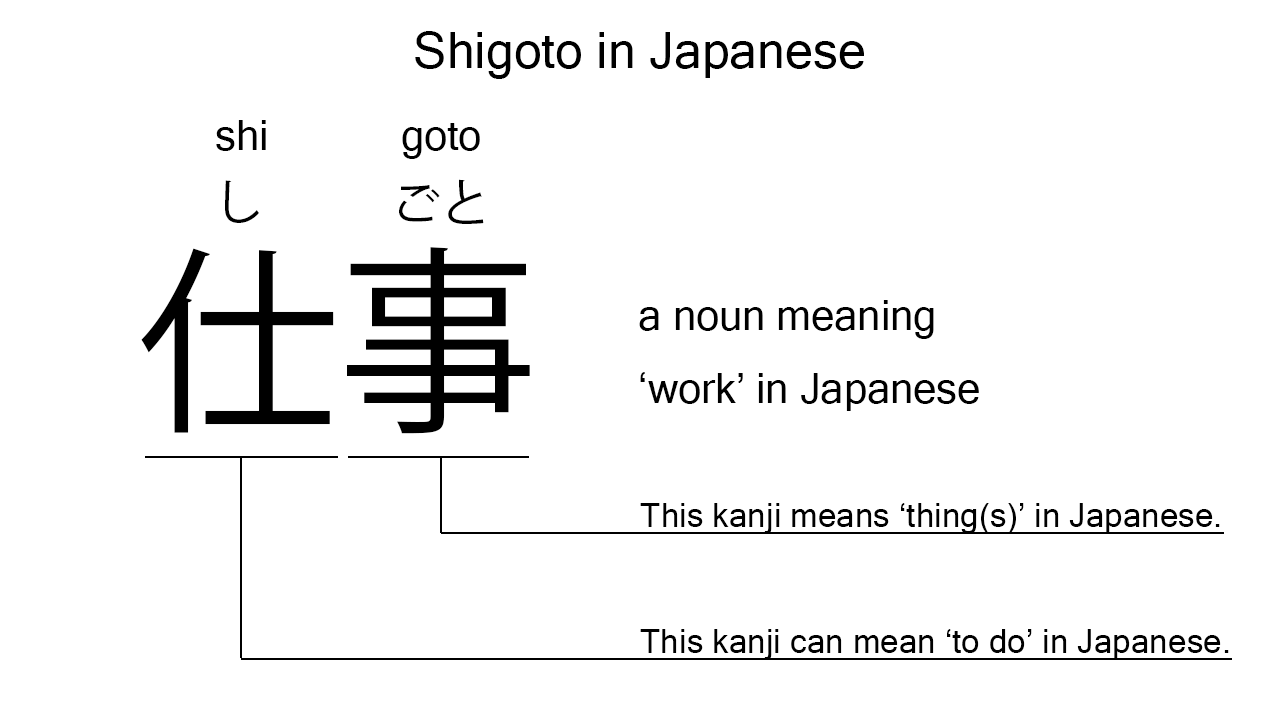What does “shigoto” mean in Japanese?
Native speakers use shigoto often to mean ‘work’ in Japanese. Perhaps, some Japanese learners know this word as it is sometimes used in Japanese conversations. In this blog post, however, I will explain this word in detail based on its kanji expression. And also, I will explain how to use it through example sentences. My explanations would help Japanese learners understand shigoto more clearly. Then, let’s get started!
Contents
Definition and meanings of “shigoto”
Let me start with the definition and meanings of shigoto.
- shigoto – 仕事 (しごと) : a noun meaning ‘work’, ‘job’, ‘business’, ‘task’, or ‘occupation’ in Japanese.
Again, but native speakers use this noun often to mean ‘work’ in Japanese. Depending on the context and situation, however, this can also mean a ‘job’, ‘business’, ‘task’, or even ‘occupation’ in Japanese.
The definition and meanings are not that difficult, I think. To understand this noun more clearly, however, let me explain its kanji characters in detail, one by one.
Shigoto in kanji
The kanji expression of shigoto consists of the following two kanji characters:
- 仕 : a kanji character used to mean ‘to do’, ‘to support’, or ‘to work’ in Japanese.
- 事 : a kanji character used to mean a ‘thing’, ‘matter’, ‘affair’, or ‘event’ in Japanese.
From these two kanji characters, we can understand that shigoto literally means ‘things to do’ in Japanese. This literal interpretation is not completely in line with the actual meanings, but still understandable, I think. Things to do can often be considered as work.

When we meet new kanji expressions, we should check their kanji characters in detail to understand their meanings clearly and deeply. In many cases, kanji characters tell us a lot about the meanings of the expressions they form. Actually, here, we could get the better understanding of shigoto through the detailed kanji check above.
So far, I’ve explained the definition and meanings of shigoto together with its kanji characters. Then, let me explain how to use it through the example sentences below.
How to say “work” in Japanese
watashi wa ashita shigoto desu – 私は明日仕事です (わたしはあしたしごとです)
I have work tomorrow.
Below are the new words used in the example sentence.
- watashi – 私 (わたし) : a pronoun meaning ‘I’ in Japanese.
- wa – は : a binding particle working as a case marker or topic marker. In the example, this works after watashi to make the subject in the sentence.
- ashita – 明日 (あした) : a noun meaning ‘tomorrow’ in Japanese. This can also work as an adverb almost anywhere in a sentence. In the example, this works as an adverb in the middle of the sentence to mean ‘tomorrow’ in Japanese.
- desu – です : an auxiliary verb used after a noun or adjective to make it polite. Probably, this is well known as a part of Japanese desu form. In the example, this is used after shigoto to make it sound polite.
This is a typical usage of shigoto. In this example, it works as a part of the widely-used phrase, ashita shigoto desu, which politely means ‘to have work tomorrow’ in Japanese. When we want to mean ‘work’ in Japanese, anyway, this noun is always a very good option.
Another example of “shigoto”
「watashi wa shigoto ga suki」 to kanojo ga it ta – 「私は仕事が好き」と彼女が言った (「わたしはしごとがすき」とかのじょがいった)
“I love my job,” she said.
Below are the new words used in the example sentence.
- ga – が : a case particle used to make the subject word or the object word in a sentence. In the example, the first ga is used after shigoto to make the object in the clause.
- suki – 好き (すき) : the stem part of the na-adjective, sukina, which means ‘favorite’ in Japanese. Native speakers, however, often use this as an individual word to mean ‘to like’ or ‘to love’ in Japanese. In the example, this is used to mean ‘to love’ in Japanese.
- to – と : a case particle working as a quote marker. In the example, this works after the clause to indicate what she said.
- kanojo – 彼女 (かのじょ) : a pronoun meaning ‘she’ in Japanese.
- ga – が : the same as explained above. In the example, the second ga is used after kanojo to make the subject in the sentence.
- it – 言っ (いっ) : one conjugation of the verb, iu, which means ‘to say’ in Japanese. In the example, it has been conjugated for the better connection with its following word.
- ta – た : an auxiliary verb used after a verb, adjective, or auxiliary verb to make its past tense form. In the example, this is used after it to make its past tense form, it ta.
This is another example of shigoto. In this example, it works in the clause to mean ‘my job’ in Japanese.
Summary
In this blog post, I’ve explained the definition and meanings of shigoto in detail based on its kanji expression. And also, I’ve explained how to use it through the example sentences. Let me summarize them as follows.
- shigoto – 仕事 (しごと) : a noun meaning ‘work’, ‘job’, ‘business’, ‘task’, or ‘occupation’ in Japanese. These two kanji characters literally mean ‘things to do’ in Japanese. This literal interpretation is not completely in line with the actual meanings, but still understandable, I think. Things to do can often be considered as work.
Hope my explanations are understandable and helpful for Japanese learners.
Leave a Reply